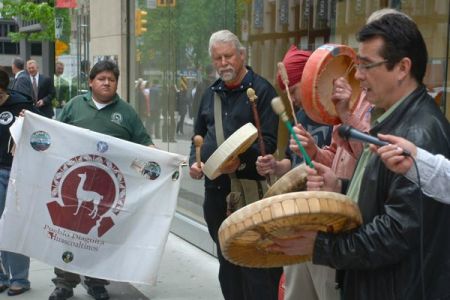STORY about IndigenousHealthEnvironment posted on June 5, 2012 by dawn
Rise up and Give Voice to Everyone
Land defenders from BC to Chile spotlighted at weekend mining conference

Demonstrators from Chile, Tsilhqot'in territory and elsewhere at Taseko's AGM on Friday June 1 // Photo by @BeyondAid
Also posted by dawn:
Also in Environment:
A conference in Vancouver over the weekend brought together people in struggle against large scale, toxic mining projects throughout the hemisphere. During events on Friday, Saturday and Sunday, dozens of people from mining affected communities between Chile and northern B.C. gathered with hundreds of allies to talk about an industry that
is threatening our collective future.
Large scale mining for precious metals, base metals and coal has and continues to threaten lands, rivers and lakes throughout British Columbia. Premier Christy Clark has promised to open up eight new mines here by 2015. But her promises are empty, according to some who were in Vancouver this weekend, because the province lacks the
authority to grant title over land that was never ceded by Indigenous people.
Speakers at the conference, which was organized by the Council of Canadians, emphasized the connections between mining projects in British Columbia and their counterparts around the world.
"When they go around the world, always look at the history, their own history," said Nitanis Desjarlais, a Cree, Gitsxan and Tsimshan woman who spoke to a crowd of over 200 on Saturday morning.
Desjarlais asked those in attendance to look out the windows of the conference room and imagine what the scenery looked like 150 years before. Instead of
being buttressed by railways, roads, buildings, and an industrial port, the waterway now known as Burrard Inlet was alive with fish and wildlife, and surrounded by rainforest. "There are stories about us bringing the salmon and taking the bones back to the river so it will
flow once again," she said. "Imagine that happening on that water side."
Desjarlais lives in Nuu Chah Nulth territory, where Vancouver based
Imperial Metals is proposing a copper and molybdenum mine. "Canadians we talk about jobs, economics," said Desjarlais. "There is no sustainable mining." This statement provoked a ripple of applause from the crowd, and reflected one of the primary themes raised by affected community members and folks who are already in direct resistance to mining projects.
Protests in front of Taseko Mines' Annual General Meeting led by the Tsilhqot'in and in front of Pacific Rim Mining Company led by a delegate from El Salvador also took place over the weekend. Community members were unequivocal in their rejection of current proposals to poison the earth for future generations in trade for gold.
Other participants, who attended the conference as an extension of their work in Ottawa or U.S. based NGOs or trade unions, took a softer line, insisting that there are appropriate methods by which to reform, regulate and monitor transnational, and especially Canadian mining corporations.
Though most of the groups involved in conference organizing do not receive direct government funding, the weekend's events lacked a meaningful connection to local grassroots struggles and activism. Delegates from around B.C. and Latin America stayed in an expensive downtown hotel instead of being offered the chance to stay in the homes of local allies. The weekend's events were either by invitation or required pre-payment by credit card.
Regardless, strength in numbers and conviction meant that Indigenous people and affected community members' stance against toxic mining and extractive capitalism wasn't drowned out.
"If original peoples die, the world dies," said Sergio Campusano, president of the Diaguita Huascualtinos Indigenous community in the Atacama Desert region of Chile. "They are the last spaces left that are alive." Campusano's community is sitting on billions of dollars of
gold, with at least three mega mines proposed in the area, two owned by Barrick Gold and the other by Goldcorp. The international allies involved in solidarity efforts with the Diaguita Huascualtinos are in two camps, each campaigning around one of the two companies. But
community members from the south, who travelled from Mexico, Guatemala, Honduras, El Salvador, Ecuador and Chile, were clear that they see their struggle as going beyond a series of mine-by-mine fights.
For José Guadalupe Gómez, from the Consejo de los Pueblos del Occidente, the majority Indigenous population of Guatemala is currently experiencing it's fourth wave of mass displacement. The first, he said, was the invasion of Spanish colonizers, the second, German coffee growers, and the third, a 36 year war that left over 200,000 dead. The fourth wave, he said, is the entry of large mining companies, particularly Canadian companies, into remote and rural regions of the country.
"The objective is not just to say no to mining companies, the objective is to build strength in our communities," said Gómez. "Today, our saying is to give life to what our ancestors said in the Popol Vuh, to rise up and to give voice to everyone."
The site for the Vancouver local of The Media Co-op has been archived and will no longer be updated. Please visit the main Media Co-op website to learn more about the organization.